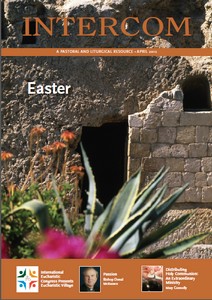April 2012 issue
Click on link to view Intercom April contents
Editorial and Newsletter resources
Feature Article
The Passion (pdf)
Bishop Donal McKeown
The Passion
During my 23 years as a teacher, I took part in many interesting school trips. But on two occasions we took a risk. En route to Easter in Rome we travelled down through England and celebrated Holy Thursday in Dover. That was all arranged so that we could arrive in Munich on Good Friday morning – and go straight to Dachau concentration camp.
From those visits, I remember two things in particular.
Firstly, we spent time in the mesmerising visitors’ centre, which charts the history of the camp which was used from 1933 until 1945. Dachau was not primarily an extermination camp but a huge prison where 200,000 people, enemies of the regime – including over 3,000 Catholic clergy – were imprisoned, brutalised and often died. The records showed the meticulous way that the ‘banality of evil’ pervaded the place. Then we had the chance to celebrate Good Friday in the Carmelite chapel that borders the camp. After what they had seen, it was easy for teenagers to enter into the Good Friday readings that speak about what human beings can do to one another. There was no need for a sermon. The encounter with records of palpable evil was powerful. Many were in quiet tears as they kissed the crucifix.
Holy Week is an important time – but not just for church-goers. It is a week in the year when we are all invited to recognise the reality of evil. Despite the all-pervasive jingles that promise fun and health, the human capacity for sin lurks behind all that we do and are. Calvary, Dachau and the history of every people – including the Irish – show how ordinary people have the capacity for extra-ordinary evil. Badness is not the exclusive property of other people out there, very different from us good people. Systems can be corrupt and can corrupt. That is the message of the first three chapters of the Bible. Those who would portray the world as otherwise are false prophets.
Secondly, on the way out of the exhibition hall at Dachau, I would glance at a book in which visitors’ comments were written after they had grasped some of the horror of human brutality. As a teacher you want to be sure that pupils are not too emotionally upset by what they have seen. On one occasion, one phrase jumped out at me. A 13 year old boy from Belfast – who had seen his father shot dead in their family kitchen – had simply written, ‘We can love one another, if we really try.’
We can respond to evil in many ways. Some will deny it, others will feel overwhelmed by it, some will be embittered be what they have seen or experienced. Some will doubt the possibility of goodness, forgiveness, healing or grace.
But the response of that Belfast boy spoke volumes to me, not just about his own teenage optimism but about Good Friday.
What we celebrate during the Easter Triduum is not just some story about a good man who was killed and then came back to life again. It is a profound statement about who God is and who we are. That story proclaims that, despite the reality of human greed and arrogance, God so loves the world that he sent his only Son (John 3:16). Jesus took upon himself in our human flesh all the sin of the world (Isa 52:4) and it crushed him. And his Resurrection was a statement that the love of God for the world could not be overwhelmed by even the worst that humans could do to each other. Because of the Resurrection, there is more grace in the world than sin, more good than evil, more hope than despair.
And what might that message be saying to the Irish Church today?
Firstly, sin is terrible in its effects and its consequences. We have just begun to recognise how violence and exploitation tear at the very heart of who we are. Can we have the ‘humbled contrite heart’ that God will not spurn? (Psalm 50)
Secondly, forgiveness is always available and possible. Can we as Church learn how to live humbly as forgiven sinners who recognise the past but are not crushed by it?
Thirdly, in an age of depressing news and prospects, sin and human evil will not have the upper hand. Can we be messengers of hope that love is come again, like wheat that springs up green?
Fourthly, can we – like the disciples on the Emmaus road – enable our society to tell a truer story about its past and discover the ongoing presence of Christ in what some see as only sadness and failure?
If we can, we will have discovered the power of Christ’s Resurrection – and be better able to joyfully celebrate the Eucharist as communion with God and with one another.
Bishop Donal McKeown
Diocese of Down & Connor
Intercom
Intercom is a pastoral and liturgical resource magazine published by Veritas, an agency of the Irish Catholic Bishops Commission on Communications.
There are ten issues per year, including double issues for July-August and December-January.
For information on subscribing to Intercom, please contact Ross Delmar (Membership Secretary):
Tel: +353 (0)1 878 8177 Email: [email protected]


